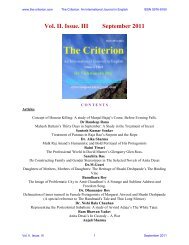PDF - The Criterion: An International Journal in English
PDF - The Criterion: An International Journal in English
PDF - The Criterion: An International Journal in English
You also want an ePaper? Increase the reach of your titles
YUMPU automatically turns print PDFs into web optimized ePapers that Google loves.
www.the-criterion.com<br />
<strong>The</strong> <strong>Criterion</strong><br />
<strong>An</strong> <strong>International</strong> <strong>Journal</strong> <strong>in</strong> <strong>English</strong> ISSN 0976-8165<br />
This is an entirely negative presentation of a man whose physical deformities reduced him<br />
almost to the level of a beast man. Indeed, it is significant that the bard of a nation which<br />
believes <strong>in</strong> the div<strong>in</strong>e right of a ruler, which looks upon k<strong>in</strong>g as God’s representative on Earth<br />
should thus powerfully impose so much bestiality upon a would-be ruler. Moreover, it is not<br />
the mere physical deformity of Richard III that Shakespeare shows. In fact, he makes his<br />
royal aspirant go a step further and h<strong>in</strong>ts at his own deformed <strong>in</strong>ner nature:<br />
<strong>An</strong>d therefore, s<strong>in</strong>ce I cannot prove a lover<br />
To enterta<strong>in</strong> these fair well spoken days,<br />
I am determ<strong>in</strong>ed to prove a villa<strong>in</strong>,<br />
<strong>An</strong>d hate the idle pleasures of these days.<br />
(I. i. 28-31)<br />
So, right at the commencement of the play it is established that Richard III is a villa<strong>in</strong>, and a<br />
villa<strong>in</strong> by choice. As an externalization of his <strong>in</strong>nermost sores and boils, he was malcreated<br />
by nature even physically. Hammond rightly comments that Richard’s “deformity is an<br />
outward and visible sign of his <strong>in</strong>ward spiritual gracelessness” (105). Thus we see that his<br />
journey beg<strong>in</strong>s <strong>in</strong> dark motives and acts, and goes on generat<strong>in</strong>g greater evils. <strong>The</strong>re is not<br />
one relationship whose holy bondage Richard III ma<strong>in</strong>ta<strong>in</strong>s. He is not merely a murderer of<br />
his hapless enemies such as the goodly k<strong>in</strong>g Henry VI and his angelic son pr<strong>in</strong>ce Edward. He<br />
is even a betrayer of the family blood – he is a blood-thirsty brother and even bloodier uncle.<br />
It is not to his own k<strong>in</strong> alone that Richard proves to be the hungry fox. He perpetrates<br />
multiple villa<strong>in</strong>ies which are presented <strong>in</strong> the play from different angles. Lady <strong>An</strong>ne, widow<br />
of Edward (Henry VI’s son), at the very outset, accuses Richard of kill<strong>in</strong>g both Henry VI and<br />
his gentle son Edward:<br />
Be it lawful that I <strong>in</strong>vocate thy ghost<br />
To hear the lamentations of poor <strong>An</strong>ne,<br />
Wife to thy Edward, to thy slaughter’d son,<br />
Stabb’d by the selfsame hand that made these wounds.<br />
(I. ii. 8-11)<br />
But she (Lady <strong>An</strong>ne) is entirely unaware of the sad fate that awaits herself. Richard first<br />
overcomes all her hatred to pay courtship to her but his purpose is suspect – “I’ll have her,<br />
but not keep her long”. This <strong>in</strong>tention is soon confirmed when he grimly looks forward to her<br />
death:<br />
I say aga<strong>in</strong>, give out<br />
That <strong>An</strong>ne, my queen, is sick and like to die.<br />
(IV. ii. 56-57).<br />
His wife’s death does not dishearten him; rather, he plans his future matrimonial alliance with<br />
the prospect of enhanc<strong>in</strong>g his political fortunes, and without the smallest consideration of the<br />
moral aspect of the alliance:<br />
I must be married to my brother’s daughter,<br />
Or else my k<strong>in</strong>gdom stands on brittle glass.<br />
(IV. iii. 60-61).<br />
This, <strong>in</strong> a nutshell, is the character of the evil m<strong>in</strong>ded and devilishly formed ruler, K<strong>in</strong>g<br />
Richard III. But can Shakespeare be supposed to make an entirely evil character be of pivotal<br />
<strong>in</strong>terest <strong>in</strong> his play? What possibly could have been Shakespeare’s reason for such a portrayal<br />
of a historical figure? A search <strong>in</strong> this matter obviously leads us to Shakespeare’s age and the<br />
various source materials utilized by him.<br />
II<br />
Vol. III. Issue. IV 3 December 2012
















